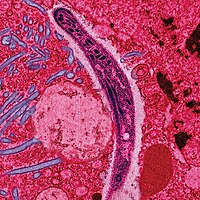
Photo from wikipedia
Healthcare workers (HCWs) are at greater risk for severe acute respiratory syndrome coronavirus-2 (SARS-CoV-2) infection. This serology surveillance study aimed to investigate the prevalence of SARS-CoV-2 antibodies among the HCWs… Click to show full abstract
Healthcare workers (HCWs) are at greater risk for severe acute respiratory syndrome coronavirus-2 (SARS-CoV-2) infection. This serology surveillance study aimed to investigate the prevalence of SARS-CoV-2 antibodies among the HCWs who were asymptomatic during the third wave of COVID-19 in Malaysia. HCWs from the Universiti Sains Malaysia (USM) Health Campus were prospectively recruited between August 2020 and March 2021 on a voluntary basis. Data on socio-demographics, possible risk factors and travel history were recorded. Serological diagnoses from serum samples were examined for total antibodies against SARS-CoV-2 using an immunoassay kit. A literature survey was performed on the compliance with infection and prevention control (IPC) practices for COVID-19 among HCWs. The majority of the total 617 HCWs participating in this study were nurses (64.3%, n = 397), followed by health attendants (20.9%, n = 129), medical doctors (9.6%, n = 59) and others (6.3%, n = 39). Of those, 28.2% (n = 174) claimed to have exposure to COVID-19 cases, including history of close contact and casual contact with infected patients. Most importantly, all serum samples were found to be non-reactive to SARS-CoV-2, although nearly half (40.0%, n = 246) of the HCWs had been involved directly in the management of acute respiratory illness cases. A proportion of 12.7% (n = 78) of the HCWs reported having underlying health problems, such as diabetes mellitus, hypertension and hyperlipidemia. Despite the presence of medical and sociological risks associated with SARS-CoV-2 infections, the current study found zero prevalence of antibodies against SARS-CoV-2 among the HCWs of USM. Based on the literature survey, the vast majority of Malaysian HCWs demonstrated good IPC practices during the pandemic (average percentage ranged between 92.2% and 99.8%). High compliance with IPC measures may have led to the low seroprevalence of SARS-CoV-2 among the HCWs.
Journal Title: Healthcare
Year Published: 2022
Link to full text (if available)
Share on Social Media: Sign Up to like & get
recommendations!